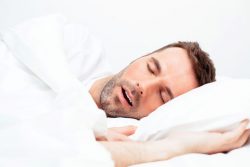Is Drooling a Sign of Sleep Apnea?
January 20, 2023
Have you ever woken up to find a wet spot on your pillow near your mouth? Or have you woken up with chapped, sore lips, especially at the corners of your mouth? It is possible that you were drooling while you were asleep. This issue can be a little embarrassing, but in some cases, it indicates a much bigger problem. Is drooling a sign of sleep apnea? Read on below to discover the answer.
What Causes Drooling?
It is important to note that in many cases, drooling is nothing to worry about. It can occur when you produce excess saliva at night, or when circumstances allow saliva to escape easily from your mouth. It might be more likely to happen if you are dealing with nasal congestion or if you have gastroesophageal reflux disease (GERD). Additionally, some medications may have drooling as a side effect.
If your drooling happens only once in a while, or if you are already fairly certain as to why it occurs, there is probably no need for you to be concerned. However, there is always the possibility that you are suffering from obstructive sleep apnea (OSA).
Drooling and OSA
OSA is a condition that causes repeated pauses in breathing throughout the night. Those pauses occur when tissues in the throat block the free flow of air.
Often, individuals with OSA cannot easily breathe through their nose at night. Therefore, they sleep with their mouth open. This allows saliva to escape.
How can you know if your drooling is a sign of OSA? Look out for these additional sleep apnea symptoms:
- Loud, frequent snoring
- Feeling tired despite getting 7 – 8 hours of sleep
- Difficulty concentrating
- Mood swings
- Frequent nighttime urination
How Can You Stop Drooling and OSA?
If you suspect you might have OSA, it is important that you seek an official diagnosis. Failure to treat this condition could endanger your long-term health.
Once you receive a diagnosis, you can consider your treatment options. You might benefit from an oral sleep appliance, which is a small mouthguard-like device that repositions the lower jaw to facilitate better breathing.
Because the appliance will be a foreign object in your mouth, it might cause a temporary increase in drooling at first. However, once you adapt to it, it should ultimately help you drool less. If the drooling continues to be a problem, speak to your treatment provider about your concerns.
Drooling may be nothing more than a minor inconvenience — or it could indicate a major health problem. Be on the lookout for signs of OSA so you can seek professional help if necessary.
Meet the Practice
Dr. Kenneth Mogell has more than a decade of experience in helping patients cope with obstructive sleep apnea. He specializes in providing custom oral appliances. If you believe your drooling is the result of OSA, he and our team would be pleased to answer your questions and guide you on your next steps. Contact any of our three locations or call our Vero Beach office at 772-882-6800.
